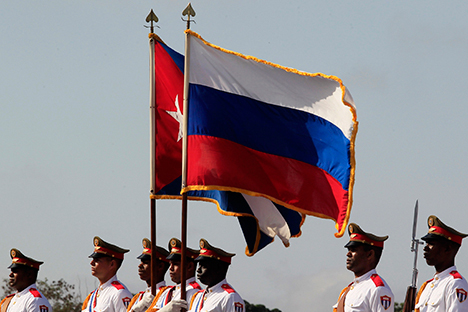
Cuba will pay only $3.2 billion back to Russia within 10 years. Source: Reuters
After more than 20 years of disputes, Russia has finally agreed to write off 90 percent of Cuba's $32.2 billion Soviet-era debt.
According to a Reuters report of Dec. 10, Moscow signed an agreement in October on debt restructuring plans discussed in February 2013 during Russian Prime Minister Dmitry Medvedev's visit to Cuba. Under the deal, Cuba will pay the remaining $3.2 billion back to Russia within 10 years. Talks continue on exactly how the money will be repaid.
There are several reasons why Moscow decided to waive Havana's debt. First, the Caribbean country is unable to pay off the entire sum (which, according to some estimates, is much higher than the officially reported figure) in the foreseeable future.
Cuba's other creditors have already realized this: in 2010, China released nearly $6 billion's worth of Cuban debt, and Japan last year cancelled 80 percent of $1.4 billion in outstanding payments. The remaining portion will have to be paid within the next 20 years.
According to recent reports, Mexico is planning to write off 70 percent of Cuba’s $500 million debt. Havana's Caribbean neighbors have either waived its debts or obtained certain economic concessions in return.
Second, the Cuban debt has up to now remained the highest among the countries which used to actively cooperate with the Soviet Union. Smaller debts, including those owed by Afghanistan ($12 billion) and Iraq ($13 billion), were restructured in 2007 and 2008.
Prior to that, Russia wrote off $5 billion owed by Nicaragua – a country completely incomparable in significance to Cuba, which had remained Moscow's key North American ally for 30 years. One prime example: the Lourdes signals intelligence facility, which could intercept phone conversations and electronic messages on most of the U.S. territory until it closed in 2003.
Finally, the current agreement paves the way for Russian loans, which are of crucial importance to the cash-strapped Cuba. In the past, the Russian Finance Ministry has repeatedly vetoed the Cabinet's proposals to lend money to Cuba, demanding that the debt issue should be settled first.
The agreement also gives hope for a revival of Russian-Cuban trade, which barely reached $220 million last year and amounted to just $163 million in the first nine months of 2013. There are also indications that cooperation could be developed in oil extraction, power generation, transportation, civil aviation, biopharmacy, and high technologies – these are the sectors mentioned in the 2009 bilateral memorandum on strategic cooperation, which served as the basis for boosting the relations between the two countries.
According to Vladimir Davydov, director of the Institute of Latin America of the Russian Academy of Sciences, the debt-cancelling agreement will improve Russian-Cuban relations. At the same time, he notes, Moscow and Havana in recent years have taken a number of political decisions and signed several agreements covering numerous areas of cooperation.
"But where is the mechanism for achieving the objectives declared in these agreements and memoranda? The absence of such a mechanism is the weakest link in the Russian-Cuban relations. Both countries should set up an effective cooperation mechanism, which would include the monetary, insurance, transportation, customs, and other aspects of support for mutual trade,” Davydov said.
“In addition, as practice demonstrates, the two sides are not always punctual in delivering on their promises. Therefore, government controls are also needed to be in place – something which is more achievable in Cuba than in Russia."
In other words, reaching new levels of cooperation will require intensified efforts from both sides. Russian companies in Cuba will have to win back what Russia once left behind light-heartedly, without even estimating how much it was losing.
For example, Russian specialists in their time spent hefty sums on oil prospecting projects on the Cuban shelf; not that oil is being extracted by Canadian, French, and Malaysian firms.
However, there are already positive examples. Russia's Zarubezhneft oil company has invested $40 million in Cuba since 2009; the company's total investments in that country should reach $2.9 billion by 2025.
The energy holding company Inter RAO UES in the past several years has completed 10 projects to supply power generation equipment to Cuba, and has partnered with the Cuban company Union Electrica to overhaul a thermal power station in the town of Mariel.
All rights reserved by Rossiyskaya Gazeta.
Subscribe
to our newsletter!
Get the week's best stories straight to your inbox